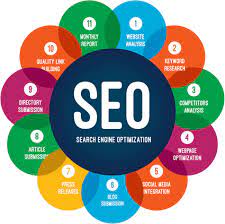
Mastering the Art of Search Engine Optimization (SEO) Strategies for Success
The Power of Search Engine Optimization (SEO)
Search Engine Optimization, commonly known as SEO, is a crucial component of digital marketing that focuses on enhancing a website’s visibility and ranking on search engine results pages.
SEO involves a variety of strategies and techniques aimed at improving a website’s organic (non-paid) traffic by making it more attractive to search engines like Google, Bing, and Yahoo.
Key Benefits of SEO:
- Increased Visibility: By optimizing your website for relevant keywords, you can improve its chances of appearing higher in search results, making it more visible to potential customers.
- Enhanced User Experience: SEO involves improving various aspects of your website, such as site speed, mobile-friendliness, and content quality, which can enhance the overall user experience.
- Higher Conversion Rates: When your website ranks higher in search results and attracts targeted traffic, you are more likely to convert visitors into customers or leads.
- Cost-Effective Marketing: Compared to traditional advertising methods, SEO is a cost-effective way to drive organic traffic to your website over the long term.
Key Components of SEO:
SEO consists of various elements that work together to improve a website’s search engine ranking. Some key components include:
- Keyword Research: Identifying relevant keywords that users are searching for in relation to your products or services.
- On-Page Optimization: Optimizing meta tags, headings, content, and images on individual web pages to make them more search engine-friendly.
- Off-Page Optimization: Building backlinks from reputable websites to improve your site’s authority and credibility.
- Technical SEO: Ensuring that your website is technically sound, with proper site structure, mobile responsiveness, and fast loading times.
In conclusion, Search Engine Optimization (SEO) plays a vital role in helping businesses improve their online presence and attract targeted traffic. By implementing effective SEO strategies and staying abreast of the latest trends in the industry, businesses can achieve sustainable growth and success in the competitive digital landscape.
Top 5 Essential SEO Tips for Boosting Your Website’s Visibility
- Create high-quality, relevant content for your website.
- Optimize your website’s meta tags, titles, and descriptions with targeted keywords.
- Improve your website’s loading speed for better user experience and search rankings.
- Build quality backlinks from reputable websites to increase your site’s authority.
- Regularly monitor and analyze your SEO performance using tools like Google Analytics.
Create high-quality, relevant content for your website.
Creating high-quality, relevant content for your website is a fundamental tip in search engine optimization (SEO). By producing content that is informative, engaging, and tailored to your target audience’s interests and needs, you not only attract visitors to your site but also improve your chances of ranking higher in search engine results. Search engines value fresh, valuable content, so regularly updating your website with quality articles, blog posts, videos, and other forms of content can help establish your site as a credible source within your industry and drive organic traffic over time.
Optimize your website’s meta tags, titles, and descriptions with targeted keywords.
To enhance your website’s search engine visibility and attract relevant traffic, it is crucial to optimize your meta tags, titles, and descriptions with targeted keywords. By strategically incorporating relevant keywords into these elements, you can improve the chances of your website appearing higher in search results for specific search queries. This optimization not only helps search engines understand the content and relevance of your pages but also entices users to click through by providing a clear and compelling preview of what your website offers. Consistent and strategic keyword optimization of meta tags, titles, and descriptions is a fundamental aspect of effective Search Engine Optimization (SEO) practices that can significantly impact your website’s online performance.
Improve your website’s loading speed for better user experience and search rankings.
Improving your website’s loading speed is a crucial tip in search engine optimization (SEO) that can have a significant impact on both user experience and search rankings. A fast-loading website not only enhances user satisfaction by providing a seamless browsing experience but also signals to search engines that your site is well-optimized and user-friendly. By prioritizing website speed optimization through strategies such as image compression, minifying code, and leveraging browser caching, you can boost your site’s performance, attract more visitors, and improve its visibility in search engine results pages.
Build quality backlinks from reputable websites to increase your site’s authority.
Building quality backlinks from reputable websites is a crucial aspect of SEO that can significantly enhance your site’s authority and credibility. When reputable websites link back to your site, search engines view it as a vote of confidence in your content, boosting your site’s visibility and ranking in search results. Quality backlinks not only drive organic traffic to your website but also establish trust among users and improve your overall online reputation. By prioritizing the acquisition of high-quality backlinks, you can strengthen your SEO strategy and position your website for long-term success in the competitive digital landscape.
Regularly monitor and analyze your SEO performance using tools like Google Analytics.
Regularly monitoring and analyzing your SEO performance using tools like Google Analytics is essential for optimizing your website’s visibility and effectiveness in search engine results. By tracking key metrics such as organic traffic, keyword rankings, bounce rates, and user engagement, you can gain valuable insights into the performance of your SEO efforts. This data allows you to identify areas for improvement, refine your strategies, and make informed decisions to enhance your website’s search engine ranking and overall online presence.